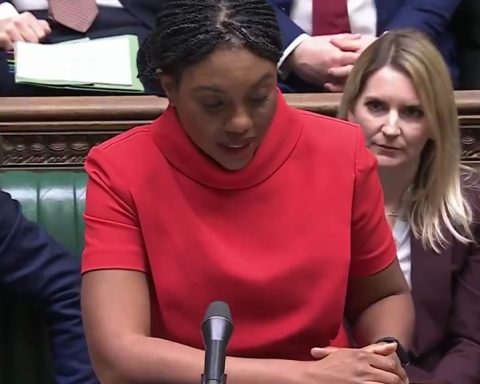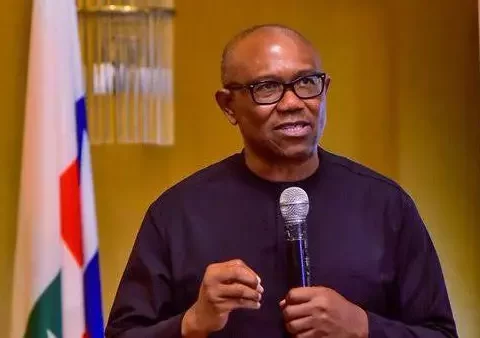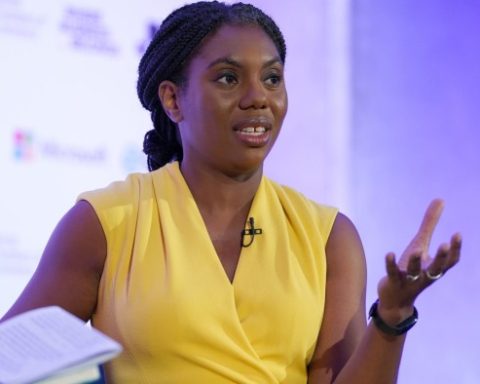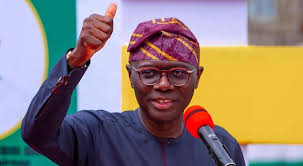British Conservative Party leader Kemi Badenoch recently reignited debate about nationality and gender rights with a claim that has drawn significant attention both in the United Kingdom and Nigeria.
Speaking in a CNN interview with Fareed Zakaria, Badenoch said she was unable to pass Nigerian citizenship to her children because she is a woman, calling it an example of unequal citizenship laws globally. She contrasted this with the UK, where she says Nigerians can easily become citizens an imbalance she suggested needs correcting.
Join our WhatsApp Channel“It’s virtually impossible, for example, to get Nigerian citizenship. I have that citizenship by virtue of my parents; I can’t give it to my children because I’m a woman,” she said. “Yet loads of Nigerians come to the UK and become British. We need to stop being naive about immigration.”
Badenoch’s remarks immediately triggered backlash in Nigeria, with legal experts, civic society organisations, and politicians pointing out that her claim is not supported by Nigerian law.
A closer examination of the Constitution reveals that the country makes no gender distinction when it comes to passing citizenship by birth to children. According to Section 25(1)(c) of the 1999 Constitution (as amended), anyone born outside Nigeria to either a Nigerian father or mother is a citizen of Nigeria by birth. This provision applies regardless of the parent’s gender, debunking the core of Badenoch’s statement.
But Nigerians online and offline have pushed back forcefully.
READ ALSO: Nigerians Fire Badenoch After Proposing Extension Of UK Residency Requirement From 6 To 15 Years
One of the most pointed rebuttals came from a fellow British-Nigerian woman, Dr Shola Mos-Shogbamimu in a now-viral video posted via her X handle, @SholaMos1. The speaker, who was also born in the UK to Nigerian parents, directly challenged Badenoch’s statement, calling it a deliberate falsehood.
“I have three children. All of them are Nigerian citizens because I want them to be,” the woman said in the video. “Kemi Badenoch also has three children. The only reason her kids are not Nigerian citizens is because she doesn’t want them to be. She came on international television and lied to embarrass Nigeria but she ended up embarrassing herself.”
Legal analysts say the law is unambiguous: Nigerian women have the constitutional right to confer citizenship on their children, even if those children are born abroad. If Badenoch is indeed a citizen of Nigeria by birth, as she claims, then her children are also entitled to Nigerian citizenship by law.
While her statement on that specific point is demonstrably false, Badenoch’s broader remarks about inequality in Nigeria’s nationality laws do find some footing elsewhere, particularly in the area of spousal citizenship. Section 26 of the same Constitution provides that a foreign woman married to a Nigerian man can acquire citizenship by registration. However, there is no reciprocal provision for foreign men married to Nigerian women. This longstanding gender imbalance has been widely criticized as discriminatory, and multiple efforts to amend the Constitution to correct it have stalled in Nigeria’s National Assembly.
Badenoch’s comments are consistent with her hardline stance on immigration in the UK. In the same interview, she pushed back against what she described as “cultural appeasement,” stating that immigrants to the UK must integrate fully rather than recreate their home countries. She warned against Nigerians forming “mini-Nigerians” in Britain, emphasizing instead the need for assimilation and shared values. These positions echo her earlier proposal to raise the minimum residency requirement for British citizenship from five to 15 years, an idea that sparked outrage among diaspora communities, especially Nigerians.
Her views on immigration are often framed through the lens of personal experience. Born Olukemi Olufunto Adegoke in Wimbledon, London, in 1980 to Nigerian Yoruba parents, Badenoch spent much of her early childhood in Lagos. She returned to the UK at age 16 and later studied computer systems engineering at the University of Sussex before transitioning into politics. She served in junior ministerial roles under Prime Ministers Boris Johnson, Liz Truss, and Rishi Sunak before emerging as the leader of the Conservative Party in late 2024. She is now considered one of the most influential voices shaping Britain’s immigration and integration policy.
Though often viewed as a symbol of Black excellence in UK politics, Badenoch has been controversial in Nigeria for distancing herself from a pan-Nigerian identity. In past interviews, she stated that she identifies more with her Yoruba ethnicity than with Nigeria as a nation, saying she had “nothing in common with people from Northern Nigeria,” including those associated with Islamic extremism. Those remarks, along with her recent statement about citizenship, have reinforced criticisms that she often weaponizes her heritage to support political narratives in the UK, while misrepresenting Nigeria in the process.
READ ALSO: Kemi Badenoch Didn’t Lie About Police Criminality, Nigerians React
Vice President Kashim Shettima is among those who have condemned her latest comments, warning that distorting legal facts about Nigeria’s constitution for political gain is irresponsible and damaging.
Joining the public backlash, Nigerian Senator Shehu Sani weighed in on the controversy, stating: “Why should Kemi Badenoch be bothered about getting a Nigerian citizenship for her offspring from a country she rebuked and rejected? She should just enjoy her adopted home and leave us alone in our father’s home.”
Ultimately, Badenoch’s assertion that Nigerian women cannot pass citizenship to their children does not hold up under legal scrutiny. The Nigerian Constitution is clear: citizenship by birth is conferred through either parent. While other aspects of Nigeria’s nationality laws do require reform to address gender imbalance especially regarding spousal rights the right of a Nigerian woman to pass on citizenship to her children is not in question.
The controversy underscores the need for accuracy and nuance when global figures invoke national laws to support political arguments. In this case, the facts do not support the claim.
Amanze Chinonye is a Staff Correspondent at Prime Business Africa, a rising star in the literary world, weaving captivating stories that transport readers to the vibrant landscapes of Nigeria and the rest of Africa. With a unique voice that blends with the newspaper's tradition and style, Chinonye's writing is a masterful exploration of the human condition, delving into themes of identity, culture, and social justice. Through her words, Chinonye paints vivid portraits of everyday African life, from the bustling markets of Nigeria's Lagos to the quiet villages of South Africa's countryside . With a keen eye for detail and a deep understanding of the complexities of Nigerian society, Chinonye's writing is both a testament to the country's rich cultural heritage and a powerful call to action for a brighter future. As a writer, Chinonye is a true storyteller, using her dexterity to educate, inspire, and uplift readers around the world.











